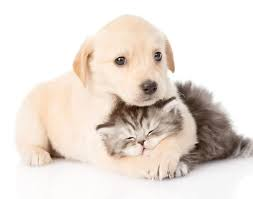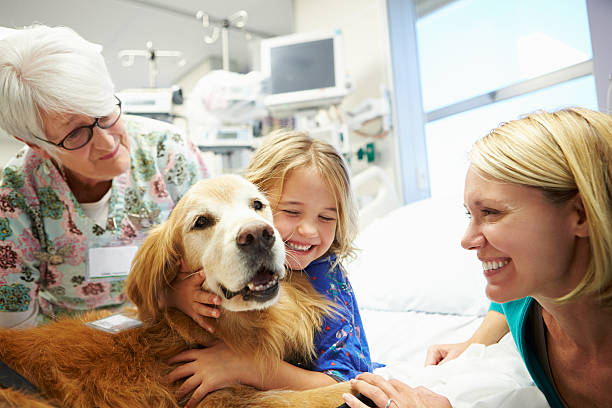Animal Doc AM Multi-Media 18September2012
Dr. Don DeForge
Hyperthyroidism in Cats
The Hyperthyroid cat, in most instances, can be helped. The exceptions will be described. Becoming old or geriatric is not a reason to ignore your special feline. Consider old as attaining wisdom!
None of us go through the "jungle of life" without realizing that each phase of life brings new experiences. Our advanced years bring to us "wisdom" with age. Einstein states, "the only source of knowledge is experience!" That experience should allow us to help ourselves, help others, and especially help the animal companions that we love dearly.
Hyperthyroidism is one of the most common problems in the middle aged to geriatric cat. It is a problem that effects multi-systems in the body and is caused by an increase in the amount of thyroid hormones that are produced by an enlarged thyroid gland. These elevated thyroid levels are most often caused by an enlargement of the thyroid [i.e. hyperplasia] or by a tumor called a benign thyroid adenoma. Carcinoma of the feline thyroid can occur but is not common.
Here are some of the common clinical signs that you should look for in your cat that would send a "red-light" signal to you to call your local doctor of veterinary medicine [LDVM} for some testing:
- Weight loss
- Hyperactivity
- Increased Thirst
- Increased Urination
- Vomiting
- Increased or Decreased Appetite
- Nervousness
- Rapid heart rate
- Diarrhea
- Panting
- Poor Hair Coat
The veterinarian diagnoses the hyperthyroid state based on a quality history of what has been happening at home; a thorough physical exam; and the appropriate testing. Some cats have enlarged thyroid nodules in their neck that the veterinarian can identify. If your cat is experiencing any of the signs mentioned above go to your LDVM immediately.
The veterinarian will order a Comprehensive Chemistry Panel and a CBC with a T4 and a Free T4 level. It is very important to evaluate kidney and heart function in cats suspected or diagnosed with Hyperthyroidism. The cardiac evaluation would include an ECG, Blood Pressure, Chest X-rays, and a sonogram of the heart called an Echocardiogram. The kidneys would be evaluated with special kidney specific chemistry profile blood testing along with an ultrasound of the kidneys. The key to hyperthyroidism treatment is a complete evaluation of the patient prior to selecting the choice of treatment. Many hyperthyroid cats can have concurrent chronic kidney disease that is being masked by the effects of being hyperthyroid.
The veterinarian will order a Comprehensive Chemistry Panel and a CBC with a T4 and a Free T4 level. It is very important to evaluate kidney and heart function in cats suspected or diagnosed with Hyperthyroidism. The cardiac evaluation would include an ECG, Blood Pressure, Chest X-rays, and a sonogram of the heart called an Echocardiogram. The kidneys would be evaluated with special kidney specific chemistry profile blood testing along with an ultrasound of the kidneys. The key to hyperthyroidism treatment is a complete evaluation of the patient prior to selecting the choice of treatment. Many hyperthyroid cats can have concurrent chronic kidney disease that is being masked by the effects of being hyperthyroid.
Some cats have borderline high thyroid values without nodules that can be felt in the neck. These patients must be seen by a specialist called a Veterinary Endocrinologist for examination, further testing, and possibly advanced thyroid imaging techniques.
The Endocrinologist will let you know after reviewing all testing if your cat is a candidate for the treatment of Hyperthyroidism. Heart failure, kidney failure, or other organ dysfunctions may prohibit treatment. Allow a specialist to make that determination. Sharing that knowledge with you leads to a complete understanding of the problems. This consultation is very important in your final decision making process.
The Endocrinologist will let you know after reviewing all testing if your cat is a candidate for the treatment of Hyperthyroidism. Heart failure, kidney failure, or other organ dysfunctions may prohibit treatment. Allow a specialist to make that determination. Sharing that knowledge with you leads to a complete understanding of the problems. This consultation is very important in your final decision making process.
Treatment:
There are three common treatment of the Hyperthyroid Cat
- Surgical Removal of the Thyroid Gland-i.e. Thyroidectomy
- Anti-thyroid Medicines-Most commonly used is a drug called Methimazole; about 15-25% of the cats on this medicine will have side effects of nausea, lethargy, loss of appetite, or an unpleasant skin rash. Liver toxic reactions and bone marrow adverse reactions, although rare, have been reported. Patients on Methimazole must be monitored carefully with clinical lab testing. The patient is not cured and the thyroid tumor can increase in size or become malignant.
- I-131 Injectable Treatment-Used in hyperthyroid cats with normal kidney function. This is considered the treatment of choice because it avoids anesthesia and surgery or having to give a medicine for life to your cat.
The northeast has one of the most prominent endocrinologists in their back yard-- Mark E Peterson, DVM-DACVIM. Thirty two years ago, Dr. Peterson's team discovered hyperthyroidism in cats and first devised the radioiodine , I-131, protocol in 1980. I-131 treatment cures hyperthyroidism by destroying the thyroid tumor. Dr. Peterson reports that 95% of the cats treated never need further treatment. He goes on to say, "Long term, radioiodine, I-131, is far less expensive, more successful, and the least risky of any of the thyroid treatment options."
Discuss I-131 treatment with your LDVM if your cat is hyperthyroid and contact Dr. Peterson who will speak to your personally. Go to info@animalendocrine.com and hit the button saying Contact Us.
This has been just a short introduction to Hyperthyroidism in cats. Dr. Mark Peterson is one of the foremost endocrinology authorities world-wide and is located in nearby Bedford Hills, NY. Phone 1-914-864-1631. Visit him on Facebook at Hypurrcat or Endocrine Clinic. Let Dr. Peterson take this short summary and expand it to enlighten you with the most up-to-date knowledge about Hyperthyroidism in cats.
Make this contact today for the health of your cat. You have been given the knowledge in this summary....now make the experience worthwhile as your cat's advocate for a quality geriatric life. “The only source of knowledge is experience” Albert Einstein
Dr. Don DeForge
Animal Doc AM-Multi-Media
Silver Sands Veterinary Center
17 Seemans Lane
Milford, CT. 06460
www.SilverSandsVeterinary.com
Visit us on Facebook at Silver Sands Veterinary
1-800-838-3368
E-Mail DoctorDeForge@yahoo.com
Dr. DeForge welcomes comments on this Blog or they can be addressed to his E-Mail.[DoctorDeForge@yahoo.com]
He is happy to speak to you at any time at 1-800-838-3368.
Cheers!
Dr. Don DeForge
Animal Doc AM-Multi-Media
Silver Sands Veterinary Center
17 Seemans Lane
Milford, CT. 06460
www.SilverSandsVeterinary.com
Visit us on Facebook at Silver Sands Veterinary
1-800-838-3368
E-Mail DoctorDeForge@yahoo.com
Dr. DeForge welcomes comments on this Blog or they can be addressed to his E-Mail.[DoctorDeForge@yahoo.com]
He is happy to speak to you at any time at 1-800-838-3368.
Cheers!



Comments
Post a Comment